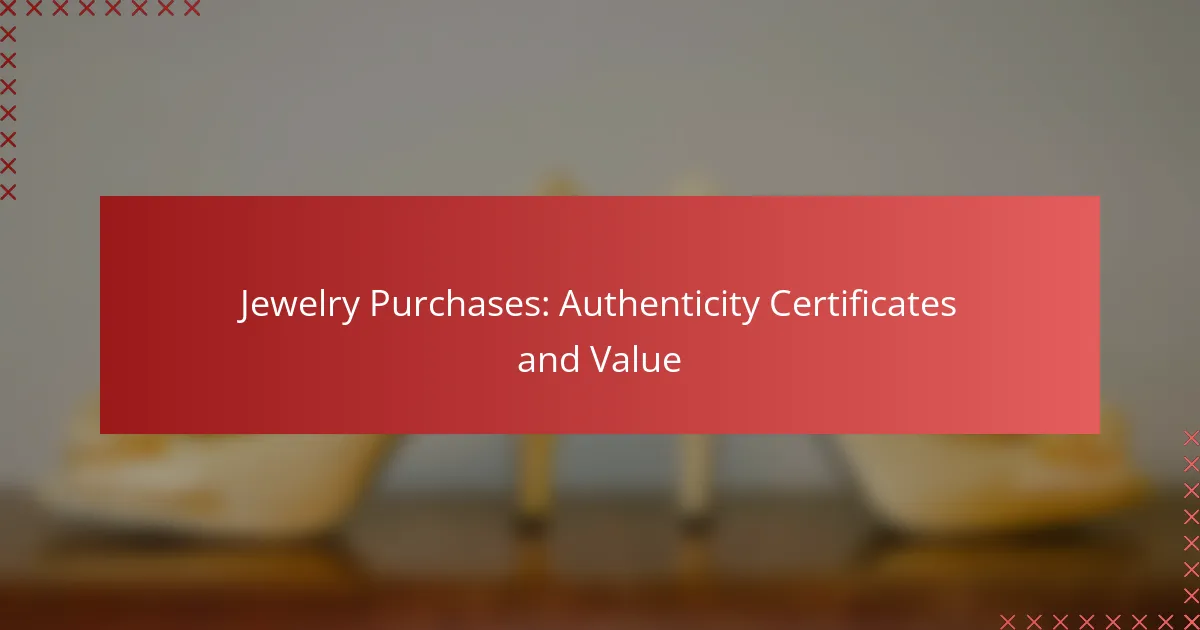When purchasing jewelry, authenticity certificates play a vital role in verifying the quality and origin of the piece. These documents not only confirm that the jewelry is genuine but also enhance its value, making them essential for both buyers and sellers. Ensuring that the certificate comes from a recognized grading organization can help safeguard your investment in the jewelry market.
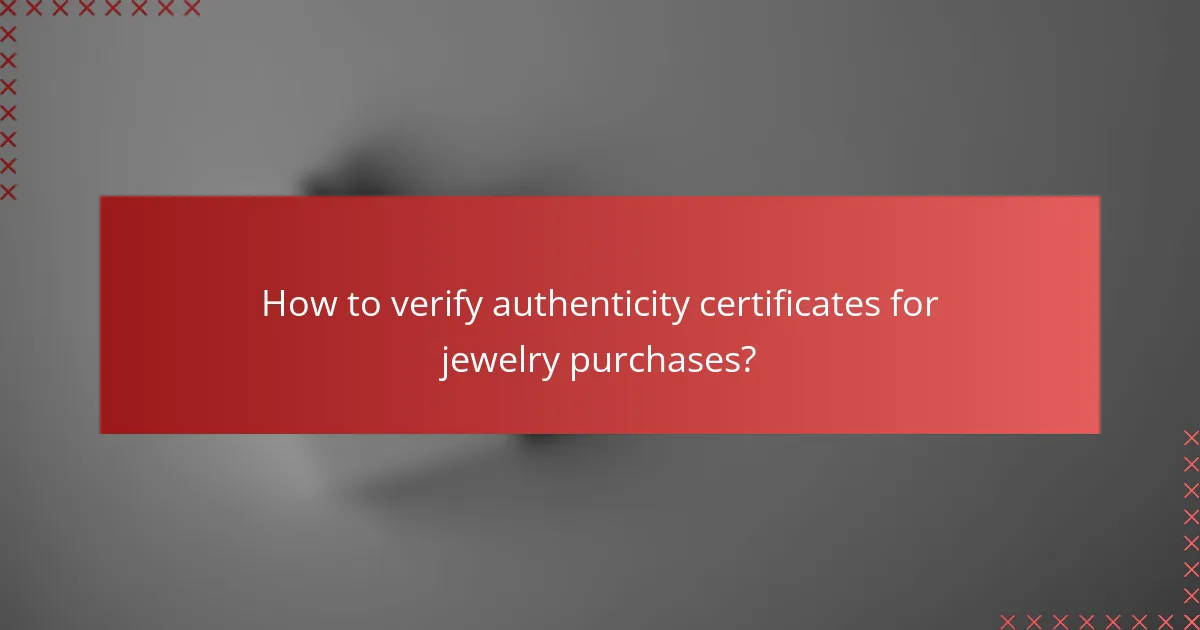
How to verify authenticity certificates for jewelry purchases?
To verify authenticity certificates for jewelry purchases, start by ensuring the certificate comes from a recognized grading organization. This process involves checking the details on the certificate and possibly consulting with a certified appraiser for further validation.
Check for reputable grading organizations
Reputable grading organizations, such as the Gemological Institute of America (GIA) or the American Gem Society (AGS), provide reliable certificates that detail the quality and authenticity of the jewelry. When purchasing, look for these organizations’ logos on the certificate to ensure credibility.
Be cautious of certificates from lesser-known or unverified sources, as they may not adhere to industry standards. Always prioritize certificates from established institutions that are recognized globally.
Examine the certificate details
Carefully review the certificate for specific details about the jewelry, including the type of gemstone, carat weight, color, clarity, and cut. Each of these attributes should be clearly defined and match the jewelry being purchased.
Look for any discrepancies between the certificate and the jewelry itself. If the details do not align, this could indicate a problem with the authenticity of the piece.
Consult with a certified appraiser
If you have doubts about the authenticity of a certificate, consulting with a certified appraiser can provide additional assurance. An appraiser can evaluate the jewelry and the certificate, offering an expert opinion on its validity.
Choose an appraiser who is accredited and has a good reputation in the industry. This step can help you avoid costly mistakes and ensure that you are making a sound investment.
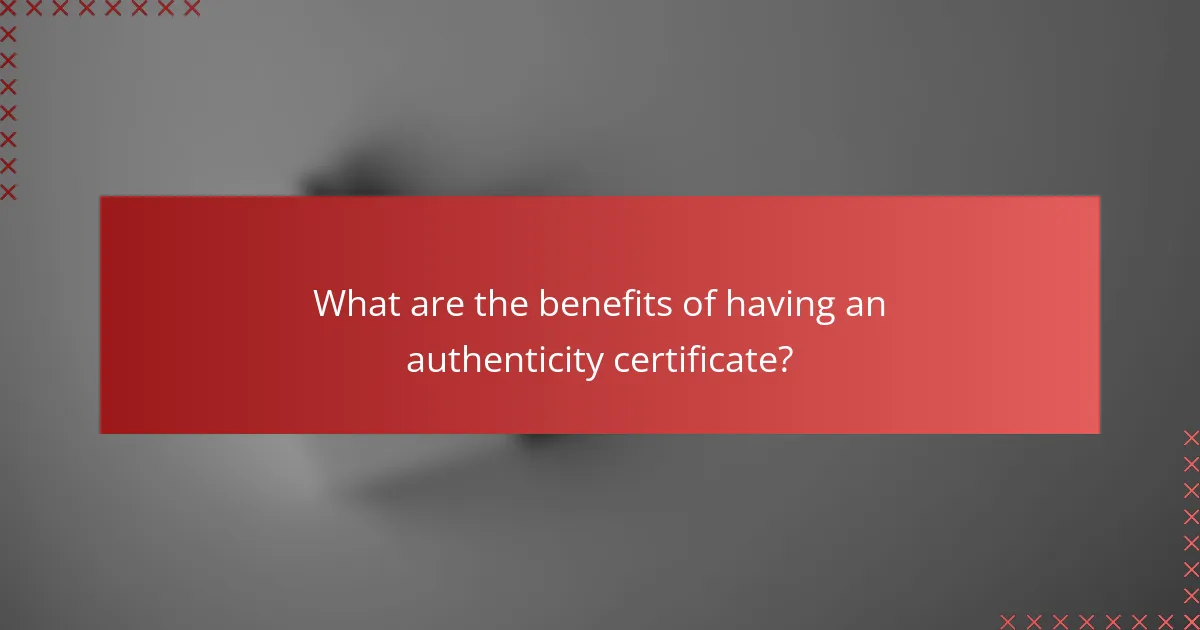
What are the benefits of having an authenticity certificate?
An authenticity certificate provides proof that a piece of jewelry is genuine, which can significantly enhance its value and desirability. This document serves as a guarantee of quality and origin, making it a crucial asset for both buyers and sellers in the jewelry market.
Increased resale value
Having an authenticity certificate can lead to a higher resale value for jewelry. Buyers are often willing to pay more for pieces that come with verified documentation, as it assures them of the item’s legitimacy and quality. For example, a certified diamond may sell for 10-30% more than a similar diamond without certification.
When considering resale, it’s wise to keep the certificate in good condition and store it safely, as losing it can diminish the value of the piece. Always check the reputation of the certifying body, as well-known organizations tend to carry more weight in the market.
Enhanced buyer confidence
An authenticity certificate enhances buyer confidence by providing assurance that the jewelry is genuine and accurately described. This is particularly important in high-value transactions, where buyers may be hesitant to invest without clear proof of authenticity.
When purchasing jewelry, look for certificates from reputable gemological laboratories. These documents typically include detailed descriptions of the item, such as carat weight, cut, color, and clarity for diamonds, which can help buyers make informed decisions.
Insurance coverage facilitation
An authenticity certificate simplifies the process of obtaining insurance coverage for valuable jewelry. Insurers often require proof of authenticity and value before issuing a policy, and a certificate provides this documentation efficiently.
When insuring jewelry, ensure that the certificate is current and accurately reflects the item’s value. Regular appraisals may be necessary to keep insurance coverage aligned with market values, especially if the jewelry appreciates over time.
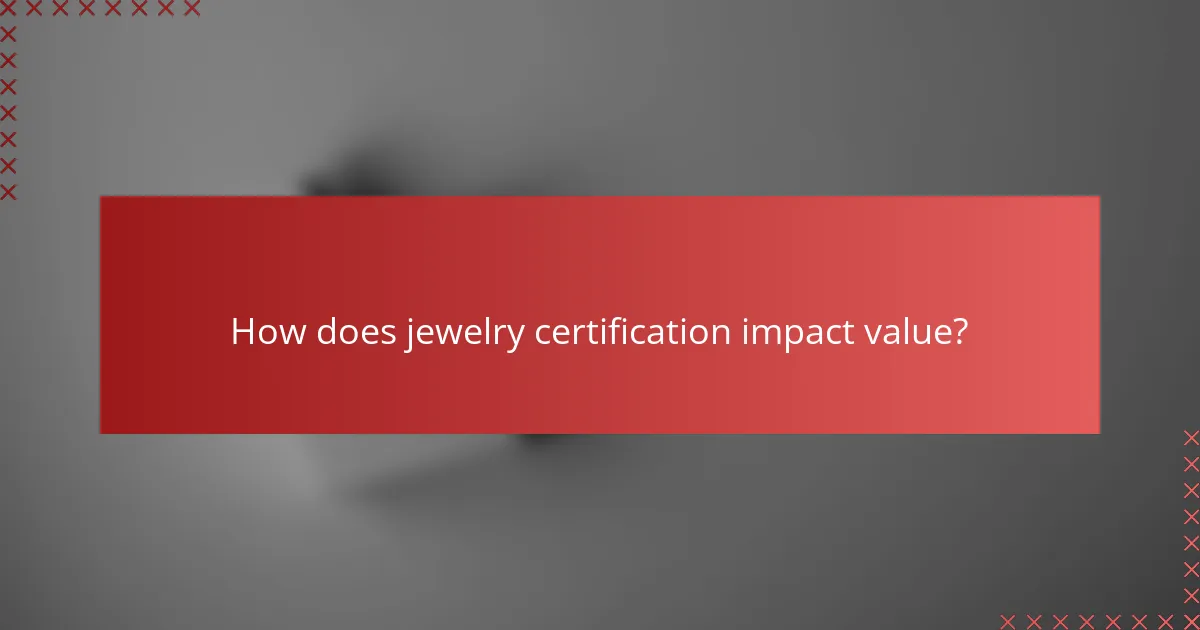
How does jewelry certification impact value?
Jewelry certification significantly affects its value by verifying authenticity, quality, and rarity. Certified pieces generally command higher prices in the market due to the assurance they provide to buyers regarding their investment.
Establishes quality and rarity
Certification establishes the quality and rarity of a piece by providing detailed assessments from recognized gemological laboratories. These assessments often include information on the gemstone’s cut, clarity, color, and carat weight, which are crucial factors in determining value.
For example, a diamond graded as “Excellent” in cut and “VVS1” in clarity will typically be valued much higher than a lower-graded stone. Buyers can use this information to compare similar pieces and make informed purchasing decisions.
Influences market demand
The presence of a certification can significantly influence market demand for jewelry. Certified items are often perceived as more trustworthy, leading to increased buyer confidence and a willingness to pay a premium.
For instance, a certified diamond may sell for 10-30% more than a non-certified equivalent, depending on the market and the certification body. This demand can fluctuate based on trends, making certification a key factor in resale value.
Provides historical provenance
Certification can also provide historical provenance, which adds to the piece’s story and appeal. Documentation of a jewelry item’s origin and previous ownership can enhance its desirability and market value.
For example, a vintage piece with a certification that traces its history to a famous designer or a notable owner can attract collectors and enthusiasts, often resulting in higher auction prices. Buyers should seek certifications that include provenance details when investing in unique or antique pieces.
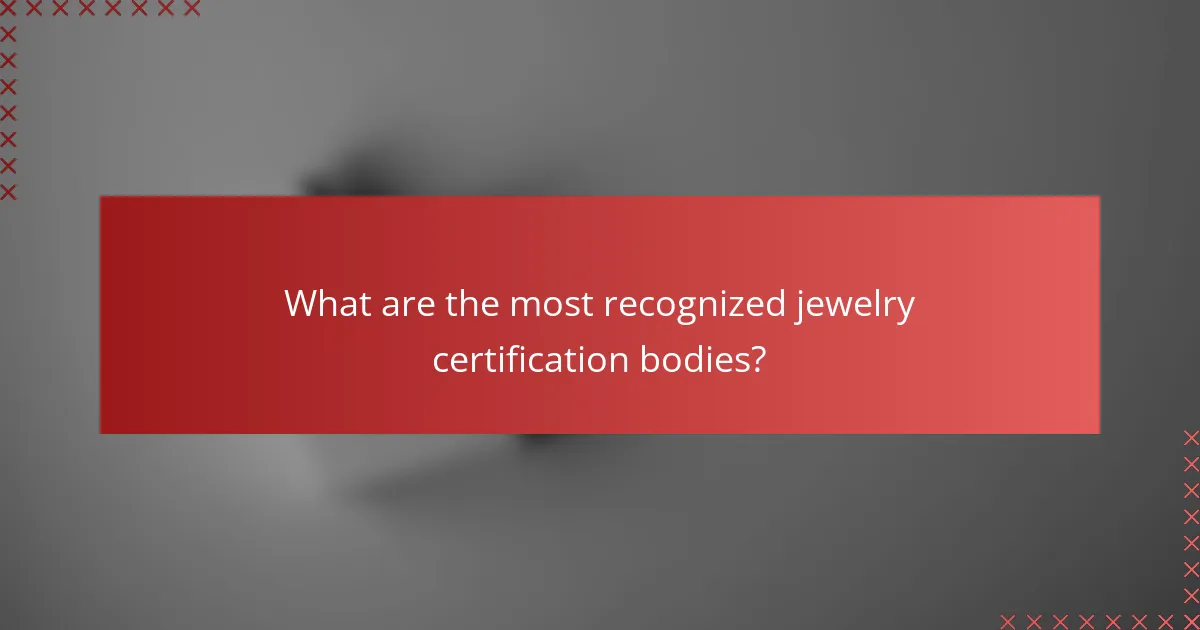
What are the most recognized jewelry certification bodies?
The most recognized jewelry certification bodies include the Gemological Institute of America (GIA), the American Gem Society (AGS), and the International Gemological Institute (IGI). These organizations provide authentication and grading services for gemstones and jewelry, ensuring quality and trust in the market.
Gemological Institute of America (GIA)
The GIA is one of the most prestigious gemological organizations globally, known for its rigorous grading standards. It offers comprehensive reports on diamonds and colored stones, detailing their characteristics such as cut, clarity, color, and carat weight.
When purchasing a diamond, look for a GIA certificate, as it is widely accepted and respected by jewelers and consumers alike. This certification can enhance the value of the piece, often resulting in higher resale potential.
American Gem Society (AGS)
The AGS is renowned for its focus on ethical practices and consumer protection in the jewelry industry. It provides grading services that emphasize the quality of diamonds, particularly in terms of cut, which is a critical factor in a stone’s brilliance.
AGS certificates are valued for their detailed assessments and are often preferred by buyers looking for high-quality diamonds. Ensure that any diamond you consider has an AGS certification to guarantee its quality and ethical sourcing.
International Gemological Institute (IGI)
The IGI is a well-respected certification body that offers grading and appraisal services for diamonds and colored gemstones. It operates globally, providing certificates that are recognized in various markets, including Europe and Asia.
IGI certifications are beneficial for buyers seeking a balance between quality and affordability. While IGI reports may not carry the same weight as GIA or AGS in certain circles, they still provide valuable information about the gemstone’s attributes.
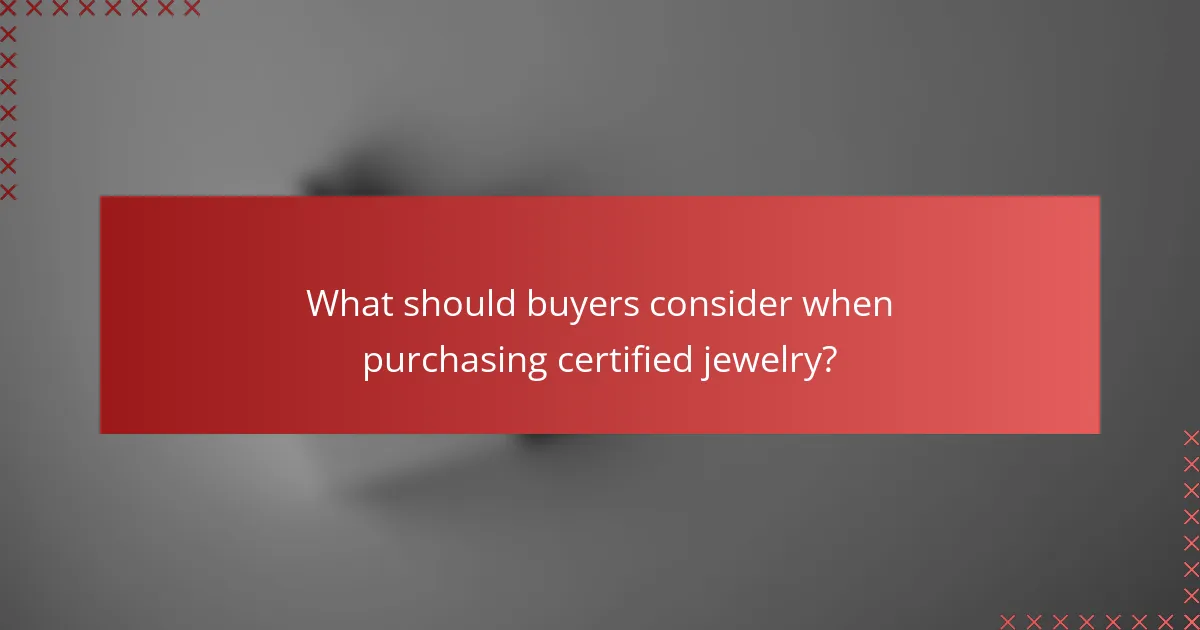
What should buyers consider when purchasing certified jewelry?
Buyers should prioritize authenticity, seller reputation, and return policies when purchasing certified jewelry. Understanding these factors can help ensure a valuable and satisfactory investment.
Understand grading scales
Grading scales are essential for evaluating the quality of jewelry, particularly gemstones and precious metals. Familiarize yourself with the commonly used grading systems, such as the Gemological Institute of America (GIA) for diamonds, which assesses cut, color, clarity, and carat weight.
Each grade can significantly impact the jewelry’s value. For example, diamonds rated as “Excellent” may cost significantly more than those rated as “Good.” Always ask for the grading report to verify the quality before making a purchase.
Evaluate the seller’s reputation
Assessing the seller’s reputation is crucial for ensuring you are buying authentic jewelry. Look for established retailers with positive reviews and ratings from previous customers. Websites like Trustpilot or local consumer protection agencies can provide insights into the seller’s reliability.
Additionally, check if the seller is affiliated with recognized organizations, such as the Jewelers of America or the American Gem Society, which can indicate a commitment to ethical practices and quality standards.
Review return policies and guarantees
Understanding return policies and guarantees is vital when purchasing certified jewelry. A reputable seller should offer a clear return policy that allows you to return or exchange the item within a specified period, typically ranging from 30 to 60 days.
Ensure that any guarantees cover authenticity and quality, providing you with peace of mind. Look for sellers who offer a money-back guarantee or a warranty that protects your investment against defects or misrepresentation.
